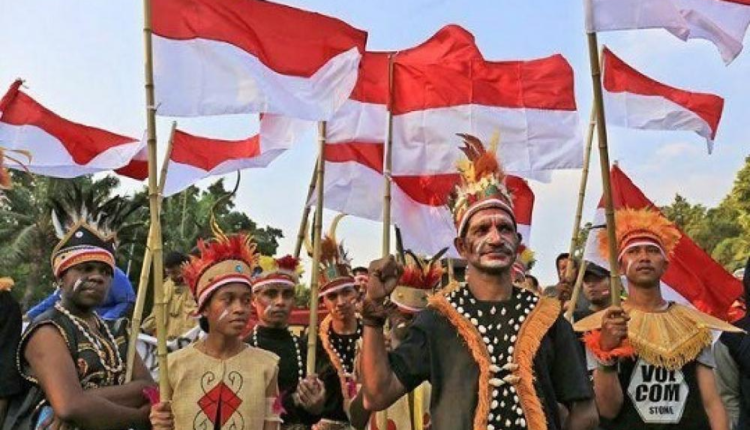As an integral part of the Republic of Indonesia, the government is intensifying cross-sector development in Papua
The process of Papua’s integration into the territory of the Republic of Indonesia has been the subject of a long and complex history. From the Dutch colonial period to the present, this journey has been marked by various conflicts, diplomatic negotiations and ongoing development efforts. However, through a number of existing facts and realities, the Papuan people firmly emphasize that Papua is an integral part of Indonesia.
History shows that the agreement to end Dutch colonialism in Papua occurred after the Round Table Conference in 1949. However, the conflict has not completely ended because the Dutch are still trying to maintain Papua as an autonomous region under its control. However, through a series of international negotiations and agreements, Papua officially joined Indonesia.
The New York Agreement in 1962 was an important milestone in the process of integrating Papua into the Republic of Indonesia. In this agreement, Indonesia and the Netherlands agreed to hand over power over Papua to the United Nations Temporary Executive Authority (UNTEA), which was then followed by the implementation of the Pepera in 1969. The results of the Pepera showed that the majority of the Papuan people chose to remain part of Indonesia, which then recognized by the UN General Assembly.
With the ratification of the Pepera results by the UN, Papua officially became an inseparable part of the Unitary State of the Republic of Indonesia. This marked the end of the long-standing conflict between Indonesia and the Netherlands regarding Papua, as well as the Dutch recognition of the Papua region as part of Indonesia.
Apart from that, concrete steps have been taken by the Indonesian government to strengthen Papua’s integration into the Republic of Indonesia. One of them is granting special autonomy status to Papua, which is regulated through Law Number 21 of 2001 concerning Special Autonomy. This reflects recognition of Papua’s cultural and historical diversity, as well as a commitment to advancing the region in an inclusive manner.
The rapid economic, social and political developments in Papua and West Papua Provinces since integration into Indonesia are also clear evidence of the success of this integration. Infrastructure development, improving public services and community empowerment efforts are the government’s priorities in ensuring prosperity for all Papuan people.
Regional expansion in Papua is a strategic step to accelerate development and equality in this vast region. The support of the Papuan people themselves for this expansion shows awareness of the importance of equitable and inclusive development throughout the Papua region.
President Joko Widodo (Jokowi) has also emphasized that regional expansion in the land of Papua is an effort to create equitable development because the land of Papua is too large for only two provinces. To facilitate service coverage, new autonomous regions (DOB) were built.
Regional expansion in Papua also comes from the aspirations of the Papuan people themselves. This aspiration has existed for several years and comes from various community groups in various regions.
With the new autonomous region, it is hoped that Papua will develop more rapidly and be on par with other developed regions in Indonesia. So that Indonesiacentric development is not just a concept but a shared spirit in advancing all regions of Indonesia, especially the Land of Cenderawasih.
Chairman of the Association of Regency Governments of All Indonesia (Apkasi), H Isran Noor stated that 99.9 percent of the Papuan people believe that they still love Indonesia and still recognize the Republic of Indonesia and only 0.1 percent are still members of the Papuan Separatist Terrorist Group (KST) or others. want to separate themselves from the Republic of Indonesia. With a strong commitment, Papua will continue to be a strong pillar of the Republic of Indonesia, maintaining the unity and integrity of Indonesia for a better future
As an inseparable part of Indonesia, with unwavering commitment, the government continues to strive for the progress of Papua through various development initiatives and community empowerment. From infrastructure to education, the government has shown genuine interest in ensuring Papua grows and develops within the framework of the Republic of Indonesia, as a reflection of the spirit of unity and progress that cuts across the country.
Thus, Papua is not only a geographical part of Indonesia, but also an integral part of the country’s identity and sovereignty. The government’s firm commitment and support from the Papuan people themselves are a strong foundation in ensuring that Papua continues to develop and contribute to the progress of Indonesia as a whole.
In this context, Papua is not just a remote region separate from Indonesia, but an inseparable part of national unity. Through recognizing and developing Papua’s potential, Indonesia reaffirms its commitment to the principles of unity and justice within the framework of the Unitary State of the Republic of Indonesia.
Support for Papua as an integral part of the Republic of Indonesia is not only about maintaining territorial integrity, but also about building a better future for the entire Indonesian nation. By recognizing Papua as part of the Unitary Republic of Indonesia, we declare our commitment to the principles of unity, justice and prosperity for all citizens, wherever they are. Papua is an inseparable part of Indonesia, and together, we can create a better future for future generations.
